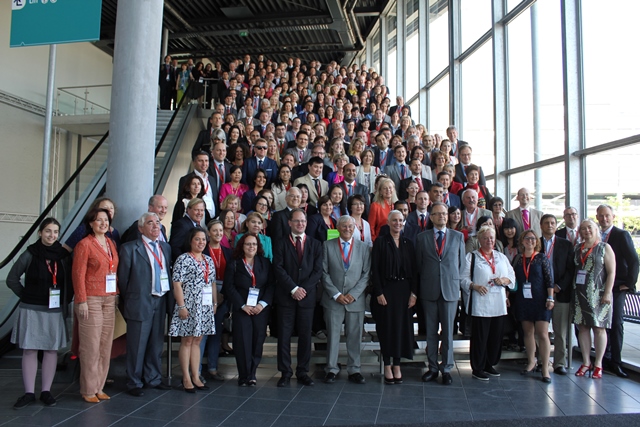
More than 400 participants from some 50 countries gathered in Maastricht, the Netherlands, last week to attend the fifth session of the Meeting of the Parties to the Convention on Access to Information, Public Participation in Decision-making and Access to Justice in Environmental Matters (Aarhus Convention) and the second session of the Meeting of the Parties to the Protocol on Pollutant Release and Transfer Registers (Protocol on PRTRs), which were held from 29 June to 4 July 2014. At a Joint High-level Segment of the two treaties, held on 2 July, Parties adopted the Maastricht Declaration, which notably highlights the importance of protecting whistle-blowers and environmental activists and ensuring safe public participation in decision-making.
Wilma Mansveld, Minister for the Environment of the Netherlands and Chair of the Joint High-level Segment, called for a future-proof Aarhus 2.0, which will reflect the opportunities new technologies offer to citizens, companies and Governments for a modern environmental policy. The value added of modern communication tools was also acknowledged in the message of United Nations Secretary General Ban Ki-moon (delivered by Acting Executive Secretary of the Economic Commission for Europe, Michael Møller), and the laudable efforts of Aarhus Parties to empower people with the right to a healthy and favourable environment were also praised.
The Maastricht Declaration recognizes transparency and access to information as being essential in building a sustainable future, and specifically encourages the use of Internet-based and social media in doing so. In addition, through the Declaration, Parties, non‑governmental organizations (NGOs), international and regional organizations welcomed the initiative to develop a regional instrument on environmental rights in Latin America and the Caribbean, as well as the establishment of pollutant release and transfer register (PRTR) systems around the globe. The Declaration underscored not only the relevance of the Convention and its Protocol for addressing modern global challenges, but also that they serve as model examples for other regions.
While welcoming the Maastricht Declaration, NGO representatives at the meeting expressed concern over various issues, including slow progress in the ratification of the Convention’s amendment on public participation in decisions on deliberate release into the environment and placing on the market of genetically modified organisms (GMO amendment), as well as a lack of progress by some Parties in implementing and complying with the Convention and its Protocol.
The various challenges in applying the Convention with respect to public participation were also highlighted by Elizabeth Smith of the European Bank for Reconstruction and Development, such as to listening to the voices of all affected people, including the most vulnerable groups, the elderly and women.
With regard to the Protocol on PRTRs, NGOs put forward several sets of proposals including the expansion of the Protocol into a “PRTR 2.0”, to encompass resource use, products and storage and the consideration of plastic as an emission.
Participants included delegates from 42 Convention and 27 Protocol Parties, as well as from Chile, Costa Rica, Morocco and Myanmar, and representatives of other United Nations agencies, international and regional organizations, international financial institutions, Aarhus Centres, business, industry and academia. The meeting was also attended by representatives of 81 NGOs from the United Nations Economic Commission for Europe (UNECE) region and from other parts of the world including Chile, China, Costa Rica, Ecuador and Thailand.
The Meeting of the Parties to the Aarhus Convention welcomed the continued leadership of the Republic of Moldova on access to information, of Sweden on access to justice, of France on the promotion of the principles of the Convention in international forums and of Austria on GMOs, and the offer by Italy to lead public participation in decision-making area of work.
For further information please visit, http://www.unece.org/env/pp/welcome.html
or contact:
Ella Behlyarova
Secretary
Convention on Access to Information, Public Participation in Decision-making and Access to Justice in Environmental Matters
Tel: + 41 (0)22 917 2376
E-mail: [email protected]
Note to editors:
The Aarhus Convention was adopted in Aarhus, Denmark, in June 1998 and signed by the European Community and 38 countries from all subregions of UNECE. It entered into force in October 2001. The GMO amendment was adopted by the Meeting of the Parties at its second session (Almaty, Kazakhstan, 25–27 May 2005).
The Parties to the Convention are: Albania, Armenia, Austria, Azerbaijan, Belarus, Belgium, Bosnia and Herzegovina, Bulgaria, Croatia, Cyprus, Czech Republic, Denmark, Estonia, European Union (EU), Finland, France, Georgia, Germany, Greece, Hungary, Iceland, Ireland, Italy, Kazakhstan, Kyrgyzstan, Latvia, Lithuania, Luxembourg, Malta, Montenegro, Netherlands, Norway, Poland, Portugal, Republic of Moldova, Romania, Serbia, Slovakia, Slovenia, Spain, Sweden, Switzerland, Tajikistan, the former Yugoslav Republic of Macedonia, Turkmenistan, Ukraine and United Kingdom of Great Britain and Northern Ireland. The Parties to the GMO amendment are: Austria, Belgium, Bulgaria, Cyprus, Czech Republic, Denmark, Estonia, EU, Finland, Germany, Hungary, Ireland, Italy, Latvia, Lithuania, Luxembourg, Netherlands, Norway, Poland, Portugal, Republic of Moldova, Romania, Slovakia, Slovenia, Spain, Sweden, Switzerland and United Kingdom. The Parties to the Convention now include the vast majority of the countries in Eastern Europe and Central Asia, all the countries in the Caucasus and South-Eastern Europe and all EU member States.